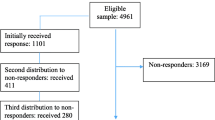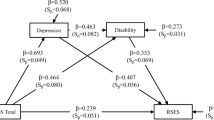Summary
The extent to which patients' reports of maladjustment is influenced by depressive symptoms was estimated in 25 acute depressed patients responding to pharmacotherapy. Their social adjustment over the same four-month period immediately prior to hospitalization was assessed on two separate occasions: firstly when they were acutely depressed, and again a mean of 20 days later when clinically recovered. Significant differences between the two reports were found in mean score of maladjustment in four out of five fields of social adjustment (work, social/leisure life, family of origin, marriage, and sex). The reduction in depressive symptoms scores (of pessimism considered separately), correlated significantly with changes in the total maladjustment score. The reduction in pessimism scores correlated with changes in the scores for both work and social/leisure fields, and also accounted for 40% of the total variance in maladjustment score. These results indicate that impaired social adjustment as assessed during the height of the depressive illness arises in part from a symptom-related overreporting bias leading patients to make a harsh appraisal of themselves.
Similar content being viewed by others
References
American Psychiatric Association (1980) DSM-III Diagnostic and Statistical Manual of Mental Disorders, 3rd edn. American Psychiatric Association, Washington DC
Blumenthal MD, Dielman TE (1975) Depressive symptomatology and role function in a general population. Arch Gen Psychiatry 32: 985–991
Bothwell S, Weissman MM (1977) Social impairment four years after an acute depressive episode. Am J Orthopsychiatry 47: 231–237
Bromet EJ, Dunn LO, Connell MM, Dew MA, Shuberg HC (1986) Longterm reliability of diagnosis lifetime major depression in a community sample. Arch Gen Psychiatry 43: 435–440
Bronisch T, Wittchen H-U, Krieg C, Rupp H-U, von Zerssen D (1985) Depressive neurosis: a long-term prospective and retrospective follow-up study of former inpatients. Acta Psychiatr Scand 71: 237–248
Clare AW, Cairns VE (1978) Design, development and use of a standardized interview to assess social maladjustment in community studies. Psychol Med 8: 589–604
De Lisio G, Maremmani I, Perugi G, Cassano GB, Deltito J, Akiskal HS (1986) Impairment of work and leisure in depressed outpatients: a preliminary communication. J Affect Dis 10: 79–84
Dohrenwend BD, Dohrenwend PD, Link B, Levav I (1983) Social functioning of psychiatric patients in contrast with community cases in the general population. Arch Gen Psychiatry 40: 1174–1182
Glazer W, Prusoff B, John K, Williams D (1981) Depression and social adjustment among chronic schizophrenic outpatients. J Nerv Ment Dis 169: 712–717
Gurland BJ, Yorkston NJ, Stone AR, Frank JD, Fleiss JL (1972a) The structured and scaled interview to assess maladjustment (SSIAM). I. Description, rationale, and development. Arch Gen Psychiatry 27: 259–264
Gurland BJ, Yorkston NJ, Golberg K, Fleiss JL, Sloane B, Cristol AH (1972b) The structured and scaled interview to assess maladjustment (SSIAM). II. Factor analysis, reliability, and validity. Arch Gen Psychiatry 27: 264–267
Gurland BJ, Yorkston NJ, Stone AR, Frank JD (1974) Structured and Scaled Inteview to Assess Maladjustment (SSIAM): Interview schedule and instruction manual, Springer Publishing Company, New York
Hamilton M (1960) A rating scale for depression. J Neurol Neuros Psychiatry 23: 56–62
Hecht H, Wittchen H-U (1988) The frequency of social dysfunction in a general population sample and in patients with mental disorders. Soc Psychiatry Psychiatr Epidemiol 23: 17–29
Helzer JE, Robins LN, Croughan JL, Welner A (1981) Renard diagnostic interview. Arch Gen Psychiatry 38: 393–399
Montgomery SA, Asberg M (1979) A new depression scale designed to be sensitive to change. Br J Psychiatry 134: 382–389
Morgado AM, Raoux N, Smith M, Allilaire J-F, Widlöcher D (1989) Sujective bias in reports of poor work adjustment in depressed patients. Acta Psychiatr Scand 80: 541–547
Paykel ES, Weissman MM (1973) Social adjustment and depression: a longitudinal study. Arch Gen Psychiatry 28: 659–663
Paykel ES, Weissman M, Prusoff MPH, Tonks CM (1971) Dimensions of social adjustment in depressed women. J Nerv Ment Dis 152: 158–172
Platt SD, Weyman AJ, Hirsch SR, Hewett S (1980) The social behaviour assessment schedule (SBAS): rationale, contents, scoring and reliability of a new interview schedule. Soc Psychiatry 15: 43–55
Radovanovic Z, Eric Lj, Levremovic I (1988) The effect of retesting on the validity of the General Health Questionnaire. Soc Psychiatry Psychiatr Epidemiol 23: 36–38
Remington M, Tyrer P (1979) The social functioning schedule—a brief semi-structured interview. Soc Psychiatry 14: 151–157
Rutter M, Brown G (1966) The reliability and validity of measures of family lyfe and relantionships in families containing a psychiatric patient. Soc Psychiatry 1: 38–53
Serban G (1979) Mental status, functioning, and stress in chronic schizophrenic patients in community care. Am J Psychiatry 136: 948–951
Serban G, Gidynski CB (1979) Relationship between cognitive defect, affect response and community adjustment in chronic schizophrenics. Br J Psychiatry 134: 602–608
Tanner J, Weissman MM, Prusoff B (1975) Social adjustment and clinical relapse in depressed patients. Compr Psychiatry 16: 547–556
Waryszak Z (1982) Symptomatology and social adjustment of psychiatric patients before and after hospitalisation. Soc Psychiatry 17: 149–154
Weissman MM, Paykel ES, Siegel R, Klerman GL (1971) The social role performance of depressed women: comparisons with a normal group. Am J Orthopsychiatry 41: 390–405
Weissman MM, Prusoff BA, Thompson WD, Harding PS, Myers JK (1978) Social adjustment by self-report in a community sample and in psychiatric outpatients. J Nerv Ment Dis 166: 317–326
Widlöcher DJ, Ghozlan A (1989) The measurement of retardation in depression. In: Hindmarch I, Stonier PD (eds) Human psychopharmacology: measurements and methods. Wiley, New York, pp 1–22
Wittchen H-V, Burke JD, Semler G, Pfister H, Cronach MV, Zaudig M (1989) Recall and dating of psychiatric symptoms: test-retest reliability of time-related symptom questions in a standardized psychiatric interview. Arch Gen Psychiatry 46: 437–443
Author information
Authors and Affiliations
Rights and permissions
About this article
Cite this article
Morgado, A., Raoux, N., Jöurdain, G. et al. Over-reporting of maladjustment by depressed subjects. Soc Psychiatry Psychiatr Epidemiol 26, 68–74 (1991). https://doi.org/10.1007/BF00791529
Accepted:
Issue Date:
DOI: https://doi.org/10.1007/BF00791529




